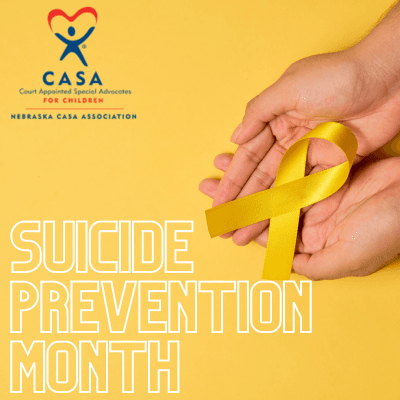
September marks Suicide Prevention Month, a crucial time to raise awareness and foster conversations about mental health, especially for vulnerable populations like children and teens in foster care.
For many youth in foster care, the emotional challenges they face are compounded by trauma, instability, and feelings of abandonment, making them more susceptible to mental health struggles, including depression, anxiety, and suicidal thoughts.
This month serves as a reminder that early intervention, support, and understanding can save lives—especially for kids and teens in the foster care system.
The Unique Challenges of Foster Care
Children and teens in foster care often face a unique set of challenges that can affect their mental health. Many have experienced significant trauma, including abuse, neglect, and family separation. The instability that comes with moving between foster homes, schools, and communities can exacerbate these issues, leaving them feeling isolated and uncared for.
Research shows that foster youth are at a higher risk for mental health disorders than their peers. According to the National Conference of State Legislatures, up to 80% of children in foster care suffer from a significant mental health issue, including depression, anxiety, and PTSD. Without proper intervention, these issues can escalate, potentially leading to suicidal ideation or attempts.
The Role of Foster Parents, Caregivers, and CASA Volunteers
Foster parents, caregivers, and other adults in the lives of foster youth play a critical role in suicide prevention. One of the most important things a caregiver can do is create a stable, supportive, and open environment where a child feels safe discussing their feelings.
Here are some ways foster parents and caregivers can support the mental health of kids and teens in their care:
- Open Communication: Foster youth need to feel they can talk about their feelings without fear of judgment. Foster parents should proactively ask about their feelings and ensure they know it's okay to ask for help.
- Promote Mental Health Care: Access to therapy and counseling is vital for foster youth. Caregivers should encourage and facilitate mental health support and regularly check in to ensure they get the needed help.
- Recognize the Signs: Being aware of the warning signs of suicidal thoughts is crucial. Some signs include withdrawal from activities, extreme mood swings, changes in sleeping or eating habits, expressing hopelessness, or talking about wanting to die.
- Foster parents, teachers, and advocates should be trained to recognize these signs and quickly act if they notice them.
Provide Stability: One of the most damaging aspects of foster care can be the instability of constantly changing homes, schools, and social circles. A stable, predictable environment helps foster youth feel safe and supported, reducing stress and anxiety.
The Importance of Community Support
In addition to caregivers, the broader community plays an essential role in supporting foster youth and preventing suicide. Teachers, social workers, and counselors should receive training on trauma-informed care and the unique challenges faced by foster children. Schools can serve as a safe haven where foster youth can build positive relationships, develop social skills, and receive consistent support.
Mentorship programs, such as CASA (Court Appointed Special Advocates) and other similar initiatives, can also significantly impact foster youth. Mentors and advocates offer guidance and emotional support, helping foster youth navigate the challenges of their circumstances and build hope for the future.
Breaking the Stigma of Mental Health in Foster Care
One of the barriers to preventing suicide in foster youth is the stigma around mental health. Many children in foster care already feel "different" from their peers and may hesitate to seek help for fear of being labeled as troubled or broken. It's essential to break this stigma by normalizing conversations about mental health and creating an environment where asking for help is seen as a sign of strength, not weakness.
Foster parents, teachers, and other adults can model this behavior by openly discussing mental health and encouraging foster youth to take care of their emotional well-being.
Resources for Suicide Prevention
If you or someone you know is struggling, resources are available to help. The National Suicide Prevention Lifeline provides free, confidential support 24/7 by calling 1-800-273-8255 or texting the Crisis Text Line at 741741.
Foster youth need to know they are not alone—there are people who care, and help is always available.
Conclusion
Suicide Prevention Month is a time to remind ourselves that every child and teen in foster care deserves support, understanding, and a stable environment where they can thrive.
By opening up conversations about mental health, providing the right resources, and creating a nurturing community, we can help prevent suicide and build a brighter future for the youth who need it most.
Every life is valuable, and every foster child has the potential to overcome their struggles with the proper support and care.
Let's ensure no child in foster care feels alone this September—and beyond.


